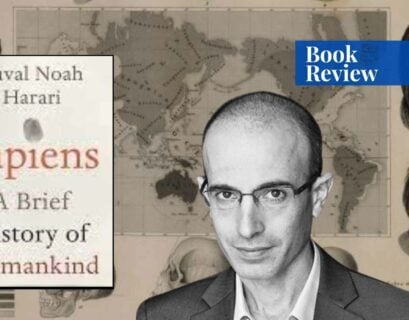Nimra Dawood is an undergraduate student, pursuing a degree in international relations from National Defence University, Islamabad. She is interested in current affairs, geopolitical trends, regional political dynamics, and power transition in the international arena. She loves to critically analyze the changing dynamics of the world and the motives of key actors.
The Book
21 Lessons for the 21st Century builds on the ideas of technological and informational revolutions discussed in great detail in an earlier book of the writer titled “Homo Deus”; here, unlike the previous book, the author has written short chapters on 21 topics and related it to the upcoming global problems that are rising because of the nexus between info-tech and biotech industries.
The book gives the idea of getting a clear perspective of what is happening in the world at times of huge amounts of irrelevant and distracting information. For this, humans have to give up on their selfish and narrow approaches and think of matters from the bigger perspective, to view things in totality and deal with the problems on a global scale for which individual nations cannot do much.
To make humans of the 21st century think for themselves, the author has focused more on the immediate political, social, economic, and technological issues while adopting a very critical, skeptical, and secular theoretical lens.
The Author
Yuval Noah Harari, a professor at the Hebrew University of Jerusalem, is considered to be an influential historian of our time. His most famous writings include Sapiens: A Brief History of Humankind, Homo Deus, and The 21 Lessons for the 21st Century in which the writer tries to answer philosophical questions about human happiness, suffering, pain, and well-being.
His favorite topics in these books are based on the futuristic assumptions of human society that would transform greatly in the wake of revolution in the fields of biotechnology and info technology. Despite living in Israel with an ordinary background who had once dreamt of sacrificing his life for the sake of the motherland, Harrari soon realized his incompatibility with Judaism.
According to him, religions are merely human inventions to unite groups and to create a source of authority among a nation instead of being a source of knowledge. In addition to this, he openly preaches his secular and atheistic ideas and supports homosexuality by declaring it a “natural thing”.
The 21 Lessons
21 Lessons for the 21st Century has been divided into five parts, namely technological challenges, political challenges, despair and hope, truth, and resilience. However, these five parts are further divided into several sub-parts, with each chapter discussing one of the 21 lessons given in the book. The 21 lessons are listed below:
- We live in a world of disillusionment which has been proven true after the rise of Trump and Brexit, creating irreversible problems for the liberal world order that has become unable to cope with the upcoming ecological collapse and technological revolution. Humans have remained unable to create an effective alternative to the liberal world order which is in phases of disruption.
- The role of human beings would become outdated in the job sectors as machines become better equipped with tools to bring effective and efficient solutions to our everyday problems. Also, if biotechnology can understand human biochemistry, it would even make humans irrelevant in decision-making and understanding. However, the writer predicts that the nursing sector and philosophers will be in high demand in the upcoming years.
- The next decade could observe hindrances in human liberty as we would be constantly in a state of surveillance by big data companies (the scenario depicted by Orwell in 1984). However, automation of everything around us could make humans rely excessively on machines and algorithms that could guide us in achieving the maximum output of our abilities.
- The disparity between the haves and have-nots in the present-day capitalist system is nothing like the one we could see after the completion of the new revolution. The writer predicts that by 2100, the richest 1% of people in the world will not only have a huge chunk of wealth but also a monopoly over beauty, creativity, and health.
- Humans living in the 21st Century are the loneliest of the entire human race which has destroyed our community life. Platforms like Facebook and Instagram may have connected people, but the need of the day is to get connected with one’s experiences first and then with other people.
- Harrari has challenged the argument of “Clash of Civilizations” because he thinks humans of the 21st Century have turned into a single civilization with an agreement over a set of principles in political and economic domains of life. We need this interdependence to overcome the upcoming global challenges.
- Nationalism for Harrari is not something bad; it is its absence that he considers problematic. Nationalism was important to overcome the tribal chaos that is still present in the states suffering from the absence of nationalism like Afghanistan. However, he also thinks that nationalism would not be able to get a better solution to the most threatening issues which we face today such as ecological collapse, nuclear war, and technological challenges.
- Religion is not a source of knowledge, rather it has just become a source of authority which is still practiced to create unity among individuals. However, he predicts that a major war can happen over the “medieval texts”.
- The problem of immigration that we see today in the West is not something related to racism, rather it is just culture.
- The idea of a capitalist market and democracy that the individual knows best is flawed because it is based on the “knowledge illusion”. In reality, a layman knows very little about things that he thinks he knows and the case is even worse for the leadership.
- The world has become highly complicated for our hunter-gatherer mindset and theft has been institutionalized so no one can know if they have a role in the bigger problems of the society or not.
- Terrorism is fed on our emotional state of fear, by taking control of our emotions we can fight against it. The theatre of terrorism is responded with a theatre of security which is not the ideal strategy for fighting against terrorism.
- For the past couple of decades, the frequency of wars and annexation has reduced significantly. Except for Russia, no major power has tried expansionist policies, therefore a major war is thought to be avoidable but not impossible.
- Nations think of themselves as the center of the universe, but in the bigger picture, such claims are mere claims and have nothing to do with reality.
- Humans created God to end the element of uncertainty in their lives, but today humans as social animals can solve almost all problems by using rationality and science.
- Secularism should not be defined in a negative connotation, rather we should describe it through its idealistic code of ethics.
- Living in a post-truth age, we have to realize that we have been socially trained to accept religions and holy scriptures just as we have socially accepted the value of currency notes. Therefore, we should make a conscious effort to get to the true meaning of things.
- The “Digital Dictatorship” shown in science fiction movies is not the real representation of the advancement in the domain of Artificial Intelligence because there is a clear difference between intelligence and consciousness. Killing the robots would not end the problem of elite control over our societies that were giving commands to those robots through algorithms.
- The education system of the 21st Century has become outdated because it is based on cramming information that is not needed today. We should focus on teaching creativity, communication, critical thinking, and collaboration so that children are more mentally flexible and emotionally balanced.
- Each one of us needs to know about our role in the bigger picture of the universe. This task can not be done through religious affiliation anymore because religion is thought to be slavery, whereas doubt is a precondition of freedom.
- The only constant thing in life is suffering, so it is better to observe ourselves and the world around us so that we can understand things before they start getting manipulated by algorithms.
The Critical Analysis
The most influential thing about the writings of Harrari is his written expression, which, unlike the other writers of his time, is not full of fancy words and crazy analogies. He has rightly pointed out the small unquestionable parts of our lives that have never been thought over and neither have we tried to figure out the actual meaning of such things.
Similarly, from a methodological standpoint, Harrari has utilized a huge variety of historical and scientific examples to make his point clear, but his research is based on subjective analysis and speculations. For example, in the chapter on secularism, Harrari has claimed that a person can be a Muslim and secular at the same time, he just has to obey the secular code of ethics.
Here, Harari has completely forgotten that for being a member of any religion, the element of freedom has to be surrendered to a higher authority making our secular claim of complete freedom impossible. The book also opens the Pandora’s box of controversial topics, discusses arguments based on the author’s subjective experiences and thinking, and concludes it by linking it to the global context without actually suggesting a way forward or a method to overcome these problems.
In other words, it can be said that the book does not contain 21 lessons, rather it is based on 21 claims or experiences. Although he shares unique and attractive arguments in chapters like terrorism and nationalism, his argumentations are fallacious in chapters like civilization, religion, and data collection by big data companies.
In addition to this, after creating an environment that brings his readers to the verge of thinking to bring a decisive change in the universe, Harrari concludes his book with a chapter on meditation and links it to his way of dealing with stressful life events. Some readers may conclude that meditation is the only way of dealing with problems and not doing something more practical about it.
Conclusion
21 Lessons for the 21st Century contains a lot of points where disagreements may occur, but it is a must-read for anyone interested in the changes our world has been going through in recent decades. The book can act as a counterargument for many of your arguments and beliefs, helping you to think about those points and get to know what others have to say about them. This is the flow of knowledge that can lead us to carry the light of knowledge in the future.
If you want to submit your articles, research papers, and book reviews, please check the Submissions page.
The views and opinions expressed in this article/paper are the author’s own and do not necessarily reflect the editorial position of Paradigm Shift.


















